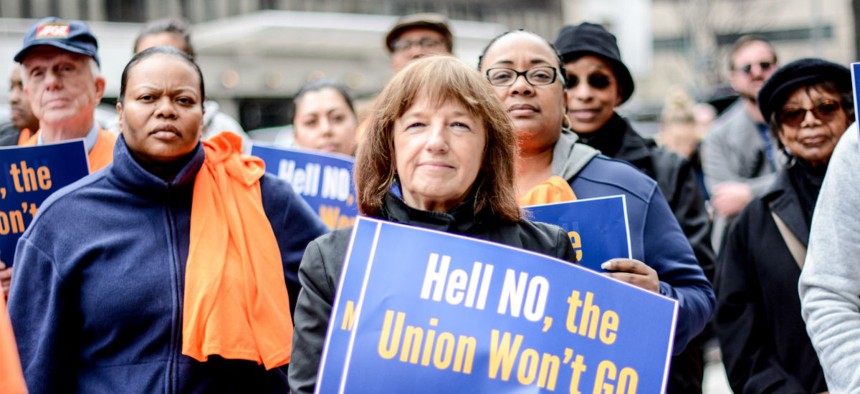
Federal union members protest the Education Department’s unilateral implementation of a new collective bargaining agreement at agency headquarters in Washington on March 28. AFGE photo
Union Leaders Demand Education Department Return to Negotiating Table
Protest outside agency headquarters draws around 100 supporters.
Labor leaders on Wednesday protested the Education Department’s unilateral implementation of a new collective bargaining agreement without buy-in of the agency’s union, and demanded negotiations on a new contract resume.
Demonstrating outside of agency headquarters, officials decried the decision earlier this month to impose a new “management edict” that stripped decades of union precedent and removed agreements on telework, step increases and bonuses, and stripped the union of its in-house office space and ability to use official time.
“They need to return to the bargaining table,” said Claudette Young, president of the American Federation of Government Employees Council 252, which represents around 4,000 Education Department employees. “Our objective is always to bargain and to bargain for a good contract. We’ll sit with a bear if we have to. So it’s time for Secretary [Betsy] Devos to come back to the table.”
AFGE officials said management left ground rule negotiations after about six months and then, instead of filing an impasse as is traditional when discussions break down, informed the union that it had drafted a new contract on its own in February. Union members voted overwhelmingly against the new deal, which replaced a 44-article agreement with a much narrower document, but the agency implemented it anyway on March 12.
Sharon Harris, president of AFGE Local 476 and a retired employee based at Education Department headquarters, said management’s contributions to ground-rule negotiations, which took place across seven three-day sessions in Washington, were haphazard and chaotic.
“The department’s representatives were always changing—it was like a revolving door,” Harris said. “When you’ve got that situation, it presents confusion and it delays the process . . . And they never really identified what their heartburn was about.”
Young, who works on federal student aid in the agency’s Chicago office, said life under the new contract seems designed to make it intentionally difficult for union officials to represent employees, which is required by law, regardless of whether the employee is a dues-paying member. The agency is rescinding office space previously designated for union use and taking back computers and other equipment, and although the new contract allows for 10 union stewards, management is only recognizing Young, requiring all grievances and other correspondence to go directly through her.
“The agency has been telling our elected officers, ‘We don’t deal with you,’” Young said. “So I’m constantly fielding everything . . . And now I’m required to go on leave without pay [instead of using official time] to work on representational issues, because failure to represent is an action that can be taken against the union.”
Without on-campus office space or agency equipment, Young said she must print out any documents she needs and then take them home. To make matters worse, she feels she is being retaliated against for her union activities, in part because management has not yet set up her desk or computer equipment despite the fact she was taken off 100 percent official time earlier this month.
“My manager, who still has a telework agreement, placed me on AWOL last week, even though I was in the office all day,” Young said. “I had just returned to my [non-union] work but there was no computer.”
AFGE filed an unfair labor practice against the Education Department earlier this month. Young said the Federal Labor Relations Authority has begun investigating the matter, but that they have not provided a timetable for resolution.
According to a memo sent to Young this month, in addition to ending official time altogether, she can take a maximum of 50 percent of her time for leave without pay for union activities. An additional “leave bank” can be distributed to up to nine representatives—one for each region—at Young’s discretion. The agency also canceled all agency-hosted union local email addresses, except the Council 252 email.







